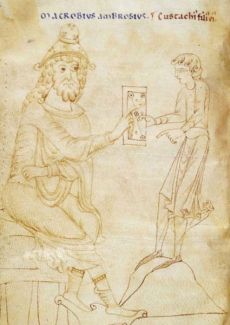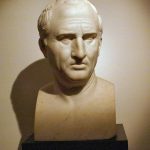Ambrosius Theodosius Macrobius was a Roman writer (but of non-Roman origin, probably Greek) and a Neoplatonic philosopher, living and creating at the turn of the 4th and 5th centuries CE.
We are uncertain about many aspects of Macrobius’ life – there are many speculations and theories about him. At the beginning of “Saturnalia” he claims that he was born sub alio ortos caelo (“under foreign heavens”). It is believed that he was a Greek who could have been born in the lands of North Africa, such as Egypt.
He dedicated his most important works to his son, Eustachius. In turn on the basis of his writings, scientists concluded that he was a pagan.
Macrobius’ most important work is the seven books of Saturnalia, a quasi-encyclopedia written in the form of dialogue. In a series of conversations between eminent Romans conducted at the home of Vettius Praetextat on the occasion of the Saturnalia festival, Macrobius included a lot of information on, among others, history, mythology and philology.
The first book is devoted to the question as to the origin of the Saturnalia festival and the festivals in honour of Janus – this leads over time to a discussion on the Roman calendar. The second volume begins with a collection of funny and short stories that appreciate, for example, Cicero and Octavian Augustus. Books three, four and six are devoted to Virgil and his works, Homer, early Roman and Greek writers. The seventh book is devoted to the psychological dispute.
Macrobius was also the author of the commentary on “The Dream of Scipion” (Commentarii in Somnium Scipionis) with Cicero’s De republica Cicero, valued in the Middle Ages, considering the problem of the soul in the spirit of the philosophy of neoplatonism. From the third work of Macrobius known to us, the grammatical treatise De differentiis et societatibus Graeci Latinique verbi, only an extract made in the 9th century by John the Scot Eriugena has survived.






